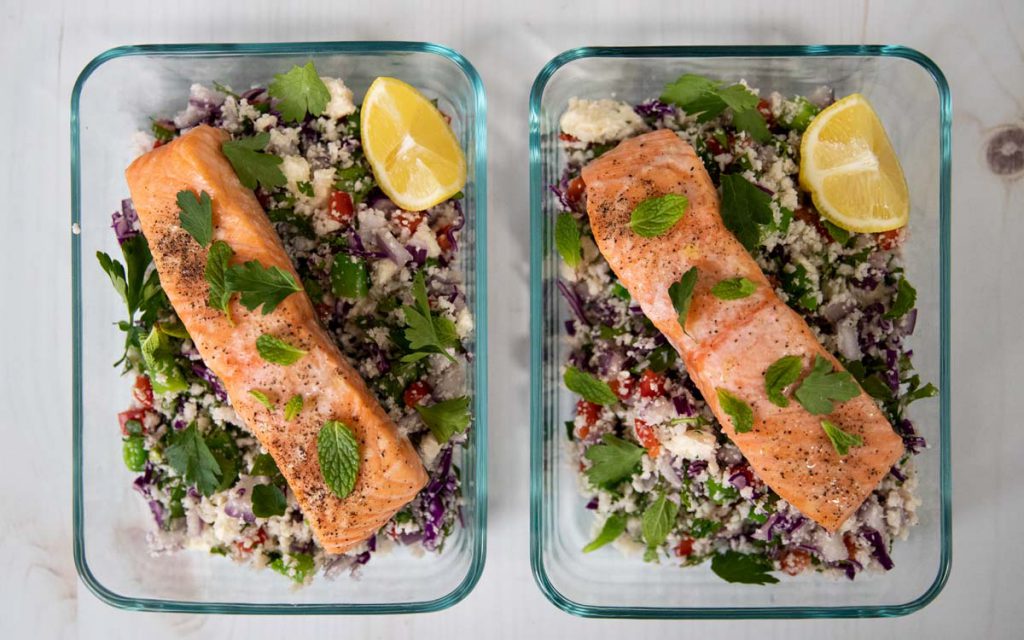Hey, guys! I’ve been on an intermittent fasting regimen for over a year now, and it really works for me! It’s been a sustainable way to manage my body fat percentage and overall health without needing to cut out my beloved sweets (hi, I’m Dasha and I’m a choco-holic.)
Intermittent fasting (IF) is a great way to optimize your metabolism without cutting out the foods that make you feel healthy and happy. That said, I’m breaking down the basics of IF and its effects on women specifically.
If it sounds like your cup of tea, check out my recipes on Mealplan and get a customized IF nutrition program based on your personal goals. Men, even though I talk a lot about IF for women in this article, my Mealplan is customizable for you, too!
I also just launched my new Fitplan, Flow to Fit! Now we can work out together and eat together! How cool is that?

What is Intermittent Fasting?
IF isn’t a new concept. It’s been practiced throughout all of human history. For centuries people have temporarily restricted their food intake for religious and spiritual reasons, and its slew of health benefits. In the past few years, IF has gained traction for its amazing results with weight loss, treating type 2 diabetes, preventing cancer, improving heart health and even slowing the aging process.
IF was popularized in 2012 by BBC broadcast journalist Dr. Michael Mosley’s TV documentary “Eat Fast, Live Longer,” as well as the book “The Fast Diet.” Journalist Kate Harrison’s “The 5:2 Diet” and Dr. Jason Fung’s 2016 bestseller “The Obesity Code” have also contributed to the IF trend. Dr. Fung also recently released “The Complete Guide to Fasting,” which I recommend.
According to Dr. Fung, intermittent fasting is an effective way to correct imbalances of hormones responsible for weight gain and obesity.
Scientific research has highlighted the idea that metabolic interventions such as calorie restriction can extend lifespan. When deprived of glucose for 12 hours or more, our bodies, and cells, start burning fats for fuel, in a process called ketosis.
In metabolizing fats, ketosis produces ketone bodies that serve as fuel for our brains (our brain gets priority when our bodies think we are starving) and healthy cells in our bodies. Cancer and all the so-called “bad” cells are not great at making the switch from using sugars to using fats as fuel. Thus, the bad cells lose their metabolic flexibility, which can be used to our advantage.
In a nutshell, fasting simply allows the body to burn off excess body fat. It is important to realize that this is a normal process and humans have evolved to fast without experiencing detrimental health consequences. Body fat is merely food energy that has been stored away. If you don’t eat, your body will simply “eat” its own fat for energy.
Unlike most diet trends, fasting isn’t a fad. It’s a lifestyle that can boost lifespan and “healthspan.”

How to Follow Intermittent Fasting
There are several different ways to follow an IF diet regimen. My go-to method is 16/8 and what this guide is mainly about.
The 16/8 Method
The 16/8 method is a 16-hour fast followed by an eight-hour eating window. The easiest way to think about it is that you’re already fasting for at least 8 hours every night while you sleep. You simply just extend this fast further by (usually) pushing your first meal or “breakfast” to later in the day.
During your fasting window the goal is to not consume any calories, but do make sure to drink plenty of water and coffee or tea, without cream and sugar, of course.
Throughout your eight-hour eating window, you can usually fit two main meals and a snack.
The 5:2 Schedule
With the 5:2 schedule, you eat normally for five days and restrict your calories to 500 to 600 a day (depending on your gender) for the remaining two non-consecutive days.
The Warrior Method
The Warrior Method means fasting for 20 hours and eating one large meal later in the day. However, you don’t completely fast before that massive feast. You’re still allowed to snack on raw fruit and vegetables during those 20 hours. I personally feel like this might work better for men, as to me, this looks like a one-way ticket to binge-town.
Eat. Stop. Eat
This method involves fasting for 24 hours once or twice per week. Pretty simple.
Alternate Day Fasting
With alternate day fasting, you eat one day and fast the next. Some versions allow up to 500 calories on fasting days and approximately 1,800 calories on your eating days. As easy as this might sound, I don’t find it suitable for females.
As I mentioned before, I prefer the 16/8 method because it’s optimal for my lifestyle and it’s easier to stick to long-term.
The 16/8 method of IF is not a diet, but more of an eating pattern where you fast for 16 hours and eat for eight. It’s one of the most popular intermittent fasting protocols and optimizes key hormones while using your fat stores for fuel. Fasting simply allows you to burn off excess body fat.
Following a schedule like this is much easier than a particular “eat this, not that” plan. Just telling yourself to not eat during certain hours of the day is actually easy. Especially once your ghrelin (i.e. hunger hormone) levels adjust to the new eating schedule, which usually happens within the first week of fasting.
Word of the day: Ghrelin.
The hunger you feel has nothing to do with your stomach being empty. It’s entirely mental. The hormone responsible is called ghrelin. Ghrelin comes and goes in cycles based on your routine eating times. Fasting has been shown to break the ghrelin routine. The more you disturb your ghrelin cycle, the more confused your body gets, and the less ghrelin it produces. This means you’ll feel less hungry even after you stop your fast.
Use ghrelin in a sentence today! “I saw a donut at work this morning and my ghrelin got really excited about it.”

Fasting vs. Starvation
Isn’t it starvation? Isn’t it dangerous for my metabolism? How will my body take its energy from fat stores?
These are questions a lot of people ask about IF.
During fasting periods, your body eventually burns through all of your carb stores (glucose and glycogen) and starts burning body fat for energy. This usually happens after 12+ hours of fasting, which is why the 16/8 method is the most popular way to fast.
When we eat, more food energy is ingested that can immediately be used. Some of this energy must be stored away for later use. If we start eating as soon as we roll out of bed and don’t stop until we go to sleep, we spend almost all our time in the fed state and likely consume more calories than we need. If we’re constantly eating, as is often recommended, then our bodies will simply use the incoming food energy and will never burn body fat. Fact: the only way to lose fat/weight is to consume less calories than you burn.
To restore balance or to lose weight we simply need to increase the amount of time we burn food energy. That’s where fasting will help you.
Fasting essentially allows the body to use its stored energy, and there is nothing wrong with that! That’s how our bodies are designed and no, it’s not starvation.
Benefits of Intermittent Fasting
On top of the obvious benefit of fat loss, fasting has tons of long-term benefits.
Fights Inflammation
Fasting helps fight inflammation, and as a result, reduces the chances of developing chronic diseases like cancer, heart disease and rheumatoid arthritis.
Promotes Brain Function
Fasting boosts your brain function and promotes mind clarity and sharpness, while also helping to prevent neurodegenerative disorders. There is no brain fog (that actually was a part of my life for many many years before I started following IF) and you find yourself more alert during the day.
It may also improve outcomes for conditions such as Parkinson’s and Alzheimer’s disease.
Note: The cited studies have been conducted on animals, and more studies are needed to evaluate the effects on brain function in humans; however, from my personal experience, I can say that my mind has never been clearer and I’ve never felt more alert. I’m naturally quite a low energy human and would always even wake up tired (I’ve been like that since my early teens) and IF has improved this situation dramatically.
Increases Longevity
IF changes the function of cells, genes and hormones:
During fasting, your cells cleanse themselves in a process called autophagy. Autophagy is one of the reasons I fell in love with this eating concept, especially after I found out about Dr. Yoshinori Ohsumi, who won the Nobel Prize in 2016 for his research on fasting and its tremendous effects on cellular self cleansing process, aka autophagy.
Check out more fascinating studies on fasting and autophagy here, here, here and here.
Improves Human Growth Hormone (HGH) Secretion
HGH is crucial for lean muscle mass growth and retention, metabolism, weight loss and muscle strength.
Studies show that fasting for 24 to 48 hours hours can increase HGH levels. Furthermore, intermittent fasting versus calorie restriction proves more effective for retention of lean muscle mass.
Boosts Your Metabolism
One of the most well known benefits of IF is that it boosts your metabolism. Short windows of fasting have shown to increase energy expenditure at rest, which means your metabolism continues burning fat while you go about your day.
Reduces Insulin Resistance
IF can potentially reduce insulin resistance, which lowers your risk of developing type 2 diabetes.
My Personal Benefits
Benefits I noticed in myself were reduced bloating, my skin cleared up, my mood improved dramatically and continues to stay stable throughout the day, and my menstrual cycle finally stabilized.

Intermittent Fasting for Women
IF appears to be safe for most women. However it’s fair to mention that a number of studies have reported side effects including hunger, mood swings, lack of concentration, reduced energy, headaches and bad breath on fasting days.
There are also online reports from women who say their menstrual cycle stopped while following an intermittent fasting diet. However, not much research has been conducted as to why these side effects occur. It might be related to female hormones, but in my personal experience it was the complete opposite – my cycle has stabilized after years and years of being extremely irregular.
Is Intermittent Fasting Right for You?
I strongly recommend consulting with your doctor before trying any form of intermittent fasting, especially if you have any health issues and concerns.
Intermittent fasting is certainly not for everyone! You might not even need it! You might be happy with your current eating style, which is great.
If you don’t feel great after trying intermittent fasting for seven to 10 days, it’s not the best method for you. Please always keep in mind that we are all different and what works for your friend might not work that well for you!
Getting Started with Intermittent Fasting
If you do decide to try fasting and have never tried anything like it before, don’t dive in too quickly. I’d been doing short fasts and some sort of subconscious IF for years, so when I started properly it was easy for me to adjust and I haven’t experienced any side effects.
Think of it as an exercise —if you’ve been sedentary and then all of a sudden you try to run a 5K, it’s not very pleasant and you’ll likely get discouraged. Getting into IF is the same thing; if you’ve been eating three meals a day plus snacks, and then suddenly stop eating anything at all for 16 hours, it’s going to be very uncomfortable.
I’d suggest easing into the routine by starting with a 12 hour fasting window (8 of which you will be asleep) and then building up to 16 hours. There will likely be a week or a bit longer of headaches, lightheadedness, and/or grouchiness, which are common side effects, but after the initial phase your mood should pick up.
Ready to get started? Get your personalized intermittent fasting program on Mealplan today!


